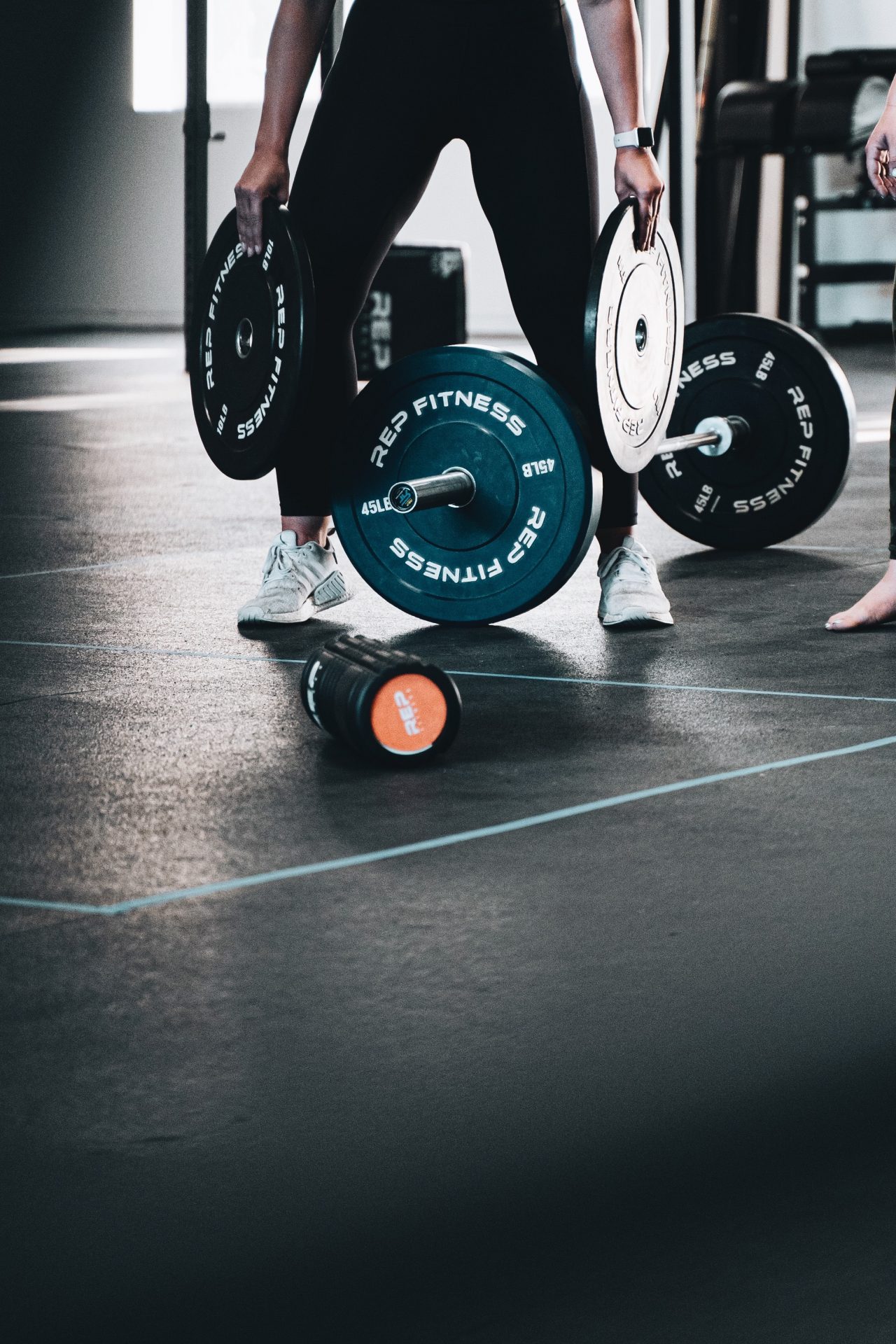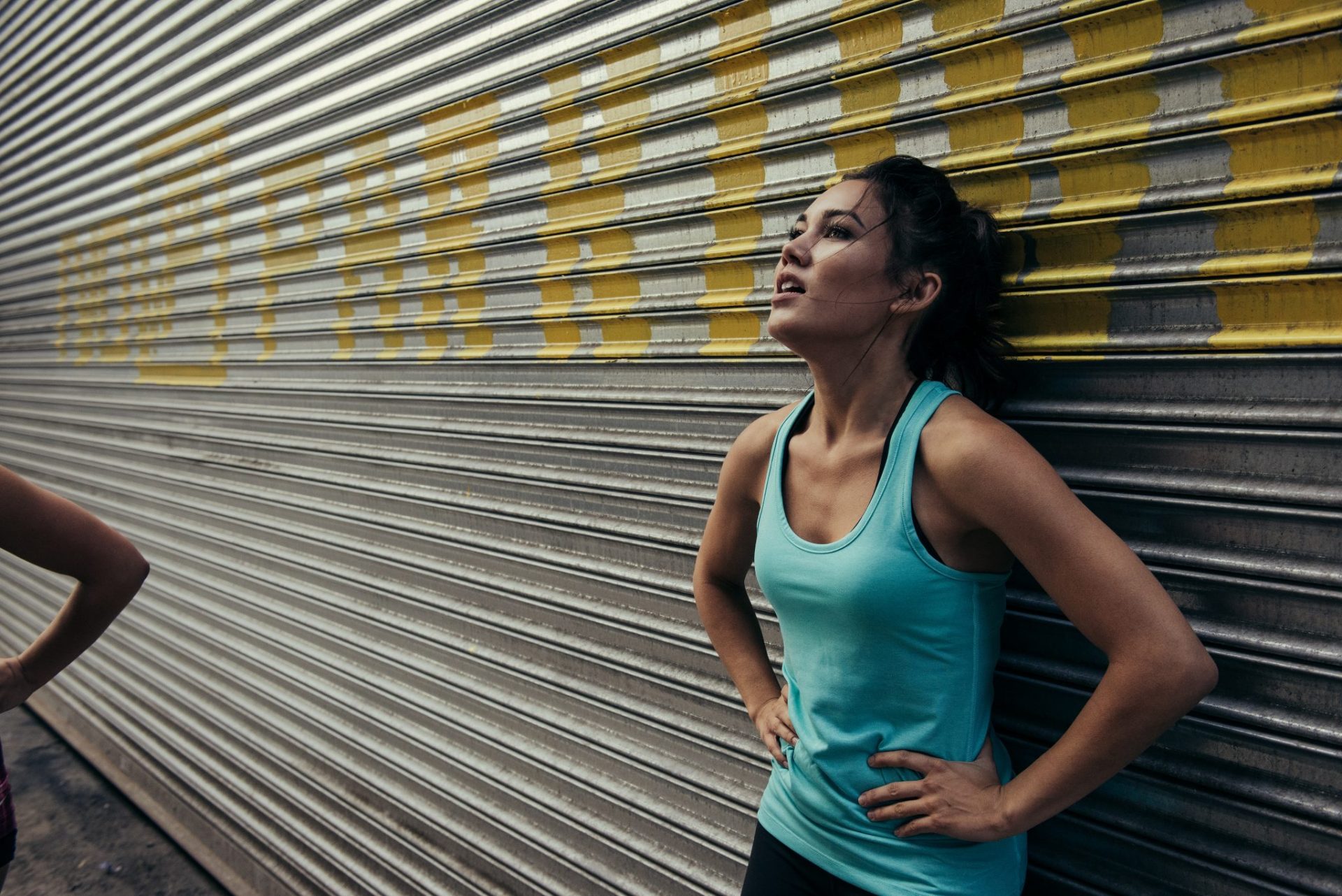Are you an all-or-nothing exerciser? One writer explains how she learned to exercise in moderation and found out that less can sometimes be more.
I’ve never been very good at moderation. While there’s a side of me that’s very disciplined, the other has the tendency to go off a cliff in dramatic fashion – and that’s partly why I gave up drinking five years ago.
In place of alcohol and cigarettes, I got really into fitness, as many teetotal types often do. Before I knew it, I was hitting the boxing gym a couple of days a week, pounding the pavements in the morning and then throwing punches at other people on a weekend (in a safe and controlled boxing environment, mind).
You may also like
“How I went from totally unsporty to kickboxing black belt”
For a while, kickboxing became my identity, bringing with it some unbelievable experience and competitions that led to a national title. I ate, slept and breathed it – living my life in such a way that was almost “optimised” for it. Why wouldn’t you, when something brings you that much joy?
When the pandemic led to the Championships being cancelled and closed boxing gyms, I had no choice but to slow down for a bit – just like I did after an accident in 2019 put me out of action for a few months. The difference was, this time, my break from the ring would be for over a year. Long enough to make me reflect on my attitude towards fitness for life.
I attempted to cling onto my pre-lockdown fitness (and some semblance of control in a pandemic) by going on longer runs than usual and throwing myself into YouTube HIIT classes. This intense overtraining led me to take a month off running in January with a hip injury. But then it seems I wasn’t the only one to fall victim of overtraining in lockdown.

“How am I still pushing myself too hard?” I complained to my housemate, stretching out my bad hip. “I’m working out much less.”
“You’re actually not, though.” She replied, bored. I appreciate this was massively a first-world problem, but I didn’t understand.
She then told me that, when we did our lockdown YouTube workouts together, she’d save pilates and non-HIIT-related videos for solo workouts “because I know you like to torture yourself.”
“Torture myself?”
She had a point. While I might not have been spending two hours in a boxing gym in the evenings, the workouts I was fitting in during lockdown were still intense. Given the option, I’d always pick HIIT over pilates or resistance bands workouts. But why?
You may also like
How often should you do HIIT? Fitness trainers explain why you should limit your interval training
I put this question to another friend, who has a similar attitude to myself when it comes to training. “I feel like I’ve not properly worked out unless it’s been really intensive,” she told me. “It’s silly and I’m sure science says ‘moderate is just as good’, but unless I’m dripping in sweat, breathless and aching all over, I don’t feel like I’ve ‘achieved’.”
“I always used to feel like exercise was very different to movement,” Eliza Flynn, now pre and postnatal personal trainer at The Warrior Method, also shared with me. “It was something which was supposed to be hard, or else it wasn’t exercise.”
Of course, this isn’t the case for everyone – but I did wonder why this attitude towards exercise was so pervasive.
Earlier on in lockdown, Nahid de Belgeonne – yoga teacher and founder of The Human Method – told Strong Women that this attitude is known as “beast mode”.
“There’s this idea that we always have to really push ourselves to do the impossible in order to get good results,” she said. “I suppose it comes from the fact that we want to spend as little time as possible doing things but getting the biggest value out of it. Unfortunately, the body doesn’t work like that.”

“I think a lot of it has to do with the messaging we hear too”, says Eliza. “Bootcamps, trainers and even activewear brands used to be all about ‘no pain, no gain,” and ‘hustle for that muscle.’
“As a PT, I felt that people needed to leave feeling totally wrung out otherwise they wouldn’t feel like they’d gotten good value. Nowadays, people are more considerate of how messaging affects people’s confidence, and I know that I’ve certainly changed how I talk to people.”
A 2019 study from Australia found that “a form of auto-addiction to hormones might be responsible for continued excessive exercising in humans”. Essentially, we get obsessed with the amazing post-workout feeling that we push ourselves harder and harder.
I’m not saying there’s anything wrong with going all-or-nothing in the gym, but it did make me wonder if it really was the “best” way to exercise. I’m all about time efficiency, but was I really making the best use of my time being on constant “beast mode?”
You may also like
Are you exercising too much during lockdown? Why it’s time to turn off “beast mode”
“It’s a complete myth that you should be red in the face and aching from head to toe after every session,” Alex Parren, a personal trainer, running coach and nutritionist for Meglio, told me “In fact, 80% of your training should feel ‘easy’ – this means you should be able to comfortably hold a conversation. This is the key to not getting injured and being able to train consistently, which is the healthiest way to build your fitness and strength.”
On top of the risk of injury and overtraining, studies have also shown that, while regular bouts of moderate exercise is good for the immune system, too much arduous exercise can suppress immunity and increase infection risk. It can also affect your thyroid hormones (says your friend here who was recently diagnosed with hypothyroidism) and, perhaps most ironically, it ramps up your cortisol levels and puts your body in a stressful state.
Speaking of irony: too much intensive exercise can ramp up your cortisol levels and puts your body in a stressful state. Nahid explained that when exercise increases stress, rather than aids in reducing it, the cortisol even becomes trapped with no outlet: “It just sits in us and starts to burn through the lining of fascia, creating dysfunction throughout the body.”
Moderation means I’m not obsessing, and I have more mental energy to think about other things
With all of this in mind, I decided to stop stressing and experiment with moderation. I started replacing the occasional run or YouTube HIIT video with something low-impact or low intensity. My housemate and I have finally done the pilates and resistance videos. Some days, we’ll just go for a brisk walk and eat TikTok pasta.
It turns out, spending a ‘moderate’ amount of time training really is enough to live the healthy, balanced lifestyle I want to live, out of lockdown and beyond. I feel good in my body, I have more energy, and it’s actually improved my running times when I do lace my trainers up.
You may also like
How learning to handstand made me stronger (even without getting sweaty)
What’s more, I’m not thinking about training all of the time, or what I’m having for dinner. Moderation means I’m not obsessing, and I have more mental energy to think about other things, making plans, seeing friends, looking forward to the future.
At the end of the day, there’s no one way of doing things. If you’re an elite athlete, get a buzz out of high-intensity workouts such as CrossFit, or would rather a quick 20-minute burst over an hour in the gym any day, you do you. There’s no perfect lifestyle, meal plan, workout, or body. But it’s important to recognise the signs if you’re burning out, and not to confuse “less” effort with “poor” effort. I see you, perfectionists.
The reasons for pushing ourselves to the max in the gym are varied. If I’m being brutally honest with myself, this experiment in moderation made me realise that mine was about calorie-burning – the result of decades of self-esteem issues, diet culture, and then some. Ironic, given how much I harp on about body positivity…
Because I have no chill, I’m not dedicated to practising what I preach. We should all know by now that exercise shouldn’t be punishment. Working out shouldn’t make food a reward. Fitness should fit into a healthy, happy lifestyle – not the other way around.
So what if I put on weight during lockdown? I’m not the same person I was in 2019. My priorities have changed, and maybe yours have too. With that in mind, it’s worth heeding the above advice from Beat as we move into a week of gyms reopening: just because you can push yourself, it doesn’t mean you should.
Follow @StrongWomenUK on Instagram for the latest workouts, delicious recipes and motivation from your favourite fitness experts.
Source: Read Full Article
